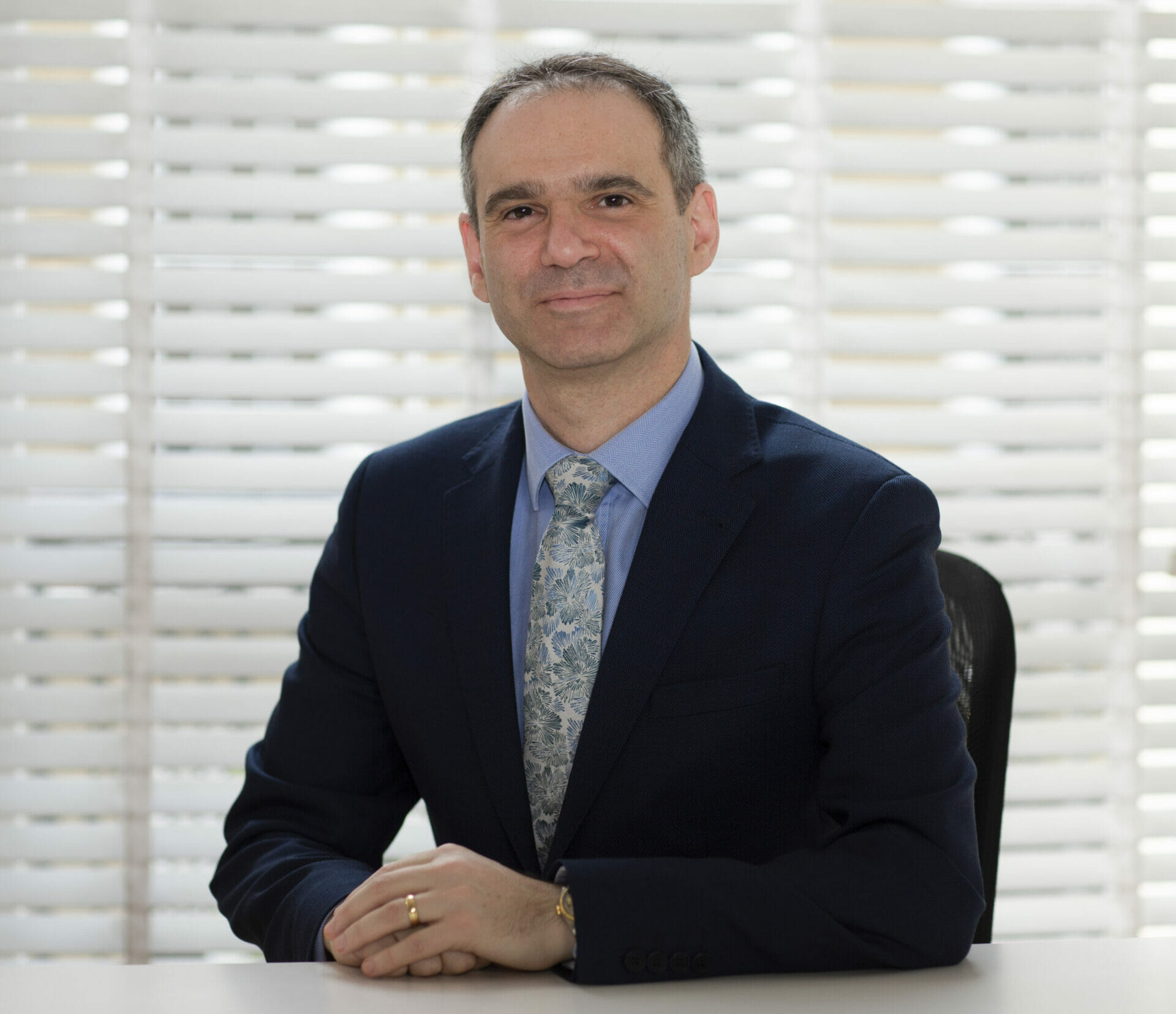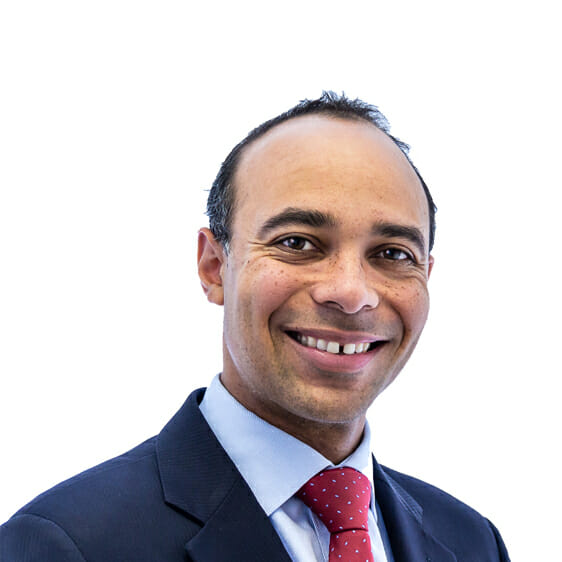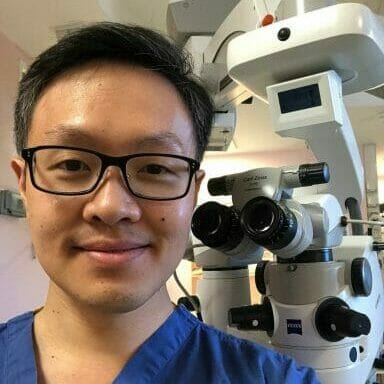London Medical Ophthalmology
Diabetic eye diseases
If you have type 1 or type 2 diabetes, you probably already know you have a higher risk of developing eye complications.
People with diabetes have a heightened risk for eye problems
Diabetes is the leading cause of preventable sight loss in the UK, so it’s critical to have annual eye exams to monitor and detect any changes in your eye health. The ophthalmologists at London Medical are the leading experts in treating and managing diabetic eye diseases such as diabetic retinopathy and diabetic macular oedema (DMO). They will work with you to develop a personalised treatment plan to protect your eye health and prevent vision loss.
Understanding diabetic eye diseases
Diabetes is a disease that affects the body in many different ways. When your blood glucose is consistently high over time, it damages your blood vessels. This can lead to complications with your heart, kidneys, feet and eyes. If you have poor blood sugar control over time, it can affect the tiny blood vessels at the back of your eyes that supply blood to the retina, the light-sensitive tissue that allows us to see.
What are the types of diabetic eye diseases?
Diabetic retinopathy is a common complication of diabetes in which the tiny blood vessels at the back of the eyes become damaged. Damage happens gradually and progresses in stages. Early diabetic retinopathy is called nonproliferative retinopathy — when the blood vessels begin to pouch, bulge or bleed into the retina. If the condition worsens, the blood vessels will close off, causing new blood vessels to grow on the surface of the retina. This is called proliferative retinopathy; if untreated, it can cause bleeding, which can result in blindness.
Diabetic maculopathy, also called diabetic macular oedema (DMO), is when the blood vessels in the eye leak fluid into the macula. The macula is located in the centre of your retina and is responsible for your fine vision and seeing detail. If fluid starts to build up in your eye, the swelling can cause blurry vision or loss of central vision.
Diabetic retinopathy is the most common eye complication of diabetes, but people with type 1 or type 2 diabetes are also at a higher risk of developing these eye conditions:
- Glaucoma
- Cataracts
- Retinal vein occlusion
- Retinal detachment (in advanced stages of retinopathy)
- Uveitis
Signs and symptoms of diabetic eye disease
There are often no early warning signs of diabetic retinopathy and diabetic maculopathy until the disease has progressed to a later stage. That’s why early detection and treatment are so important.
If you experience any of the following signs or symptoms, you should see an ophthalmologist for a complete eye exam:
- gradual deterioration of vision
- blurred central vision
- frequently changing vision
- sudden loss of vision
- dark shapes floating in your field of vision (floaters)
- pain or redness of the eye.
Who is at risk?
Anyone with type 1 or type 2 diabetes can develop diabetic eye disease, but you are more at risk if you:
- have had diabetes for a long time
- have consistently high blood sugar
- have high blood pressure that is untreated
- have high cholesterol levels
- are a smoker
- are pregnant
- are of Asian and Afro-Caribbean descent.
Our approach to treating diabetic eye diseases
At London Medical, you’ll receive the very best care from leading ophthalmologists at the cutting edge of their field. London Medical brings together state-of-the-art equipment and diagnostics, a friendly and caring team and prompt treatment tailored to your needs — all in our comfortable and accessible ground-floor clinic.
We know it can be frightening to be diagnosed with an eye condition. In addition to outstanding eye care, you’ll also have access to end-to-end diabetes support. Co-located with London Medical, the London Diabetes Center is the UK’s leading private provider of specialist diabetes care. A world-class team of diabetologists, dieticians and diabetic nurses will help you maintain control of your blood glucose levels and provide expert tips on leading a healthy life with diabetes.
Getting diagnosed
Regular eye screenings are vital for the early detection of diabetic eye disease. The London Diabetes Centre offers annual screenings as part of its face-to-face support plans. Alternatively, you can book an appointment with us if you would like a second opinion on your NHS screening results or if you have noticed any changes in your vision that you are concerned about.
A complete eye exam typically includes the following investigations:
A visual acuity test is an eye exam that checks how well you see the details of a letter or symbol from a specific distance.
A tonometry test will measure your intraocular pressure (IOP). IOP is an important test for evaluating your risk of glaucoma.
Fundus photography is used to inspect anomalies associated with diseases affecting the eye and to monitor their progression. It is used to diagnose and monitor macular degeneration, retinal lesions and diabetic retinopathy.
Optical coherence tomography (OCT) is a non-invasive imaging test which uses light waves to take cross-sectional pictures of your retina, mapping retinal thickness. With OCT, your ophthalmologist can see each of the retina’s distinctive layers. It also provides diagnosis and treatment guidance for macular degeneration, vein occlusions, glaucoma and diabetic eye disease.
What are my treatment options for diabetic eye disease?
In the early stages of diabetic retinopathy and diabetic maculopathy, your ophthalmologist will advise you to have more frequent screenings to monitor your condition. Meanwhile, you will be advised to control and manage your blood sugar and make healthy lifestyle changes that can slow the progression of diabetic eye disease.
If your condition is more advanced, you will need immediate treatment to prevent vision loss. Your consultant might recommend one or more of the following treatments:
Intravitreal injections
Anti-VEGF drugs can help to stop fluid leakage in the back of the eye and improve vision. In some circumstances, it can help to block the growth of abnormal blood vessels in the eye. At London Medical, we offer access to the latest and most effective approved drugs on the market, including Vabysmo, a newly approved drug that shows promising outcomes for our patients. Your consultant will use numbing drops before the eye injections are given. Although these can be slightly uncomfortable and you feel a sensation of pressure, injections are usually quick and not very painful.
Laser treatment
Laser treatment is often performed to stop leakage of blood vessels in the macular region and to shrink abnormal blood vessels in proliferative retinopathy. This can halt the progression of advanced cases, but it will not restore any vision that has been lost. Several sessions will be required, but your consultant can offer laser treatment as an outpatient service in our clinic.
Vitrectomy
Vitrectomy is a surgical procedure performed under local anaesthetic and sedation at a nearby hospital. If you have extensive bleeding or scarring due to advanced proliferative retinopathy, your consultant will remove and replace the clear gel in the eye called the vitreous. Your consultant will answer any questions and carefully review the benefits and risks of this surgery with you.
Prevention and lifestyle changes
The best way to lower your risk for diabetic retinopathy and other common eye complications is by managing your diabetes. This means keeping your blood sugars in a healthy range.
If you have diabetes, there are many steps you can take to protect and improve your overall eye health:
- Don’t miss your annual screenings.
- Keep to your target blood sugar levels.
- Manage your blood pressure and cholesterol levels.
- Stay active.
- Quit smoking.
If you need help with blood sugar control, The London Diabetes Centre offers expert guidance to all patients with diabetes, including carbohydrate counting courses, diabetes technology support and personalised diet and exercise plans.
Our Consultants
Professor Michel Michaelides
Professor of Ophthalmology & consultant ophthalmic surgeon at UCL Institute of Ophthalmology and Moorfields Eye Hospital.
Professor Adnan Tufail
One of the leading ophthalmic surgeons in the UK. He is the clinical and research lead at Moorfields Eye Hospital in London for age-related macular degeneration and has worked as a consultant here since 2002.
Mrs Samantha Mann
Consultant ophthalmologist specialising in medical retina, macular degeneration, retinal vein occlusions and diabetic eye disease including injection and laser treatments.
Mr Praveen Patel
International reputation for providing excellence in patient care with macular disease and is also actively involved in research for finding novel therapies for the condition.
Mr Peter Addison
Consultant ophthalmic surgeon who has vast experience in managing the entire breadth of medical retina and uveitis conditions.
Mr Jonathan Dowler
Former consultant in medical retina at Moorfields Eye Hospital. He retired from the NHS in 2012 to take up full-time private practice in retinal disease including diabetic retinopathy and macular degeneration.
Mr Hadi Zambarakji
Consultant Ophthalmic surgeon based at Barts Health in the NHS with a specialist interest in the management of diabetic eye disease, vitreoretinal surgery and cataract surgery.
Mr Robin D Hamilton
A specialist in diabetic retinopathy, age-related macular degeneration, retinal vein occlusions, inflammatory eye disease, and cataract surgery.
Mr Bishwanath Pal
Globally recognised retinal specialist with over 25 years of experience in ophthalmology.
Mr Jason Ho
Consultant ophthalmologist and vitreoretinal surgeon with sub-specialty interests in medical retina.
Our Location
London Medical is located in the Harley Street medical area. Together with top experts across a range of multi-disciplinary fields, we offer the finest facilities for your care, all under one roof.
Monday to Friday 8.30am to 8pm
Monday to Friday 8.30am to 8pm
Monday to Friday 8.30am to 8pm
Speak to a member of our team
Contact the appointments team
For private GP appointments, please book
Make an enquiry online using this form and one of our team will be in touch. By using this form you agree with the storage and handling of your data by our team. Alternatively, you can contact us.
You don't need a referral from your GP to make an appointment with us.
Please note, we require this information as part of our registration process.










